There are many stories of mothers in the Bible, stories of faithfulness, of doubt, of prayer, of rivalry and conflict, of risk, and of blessing. Here is a collection of 15 stories of mothers in the Bible who prayed for their children, took risks, demonstrated great faith, and who sometimes also got things wrong.
Many of the inspiring stories come from stories of mothers in the Bible who prayed. We see Hannah’s prayer for her son Samuel in 1 Samuel chapter 1, demonstrating her faith and her willingness to surrender to God. We see Hagar’s encountering God and her naming him “the God who sees me” in Genesis. And we see many other mothers in the Bible take risks, turn to God, demonstrate faithfulness, receive blessing, and inspire those around them.
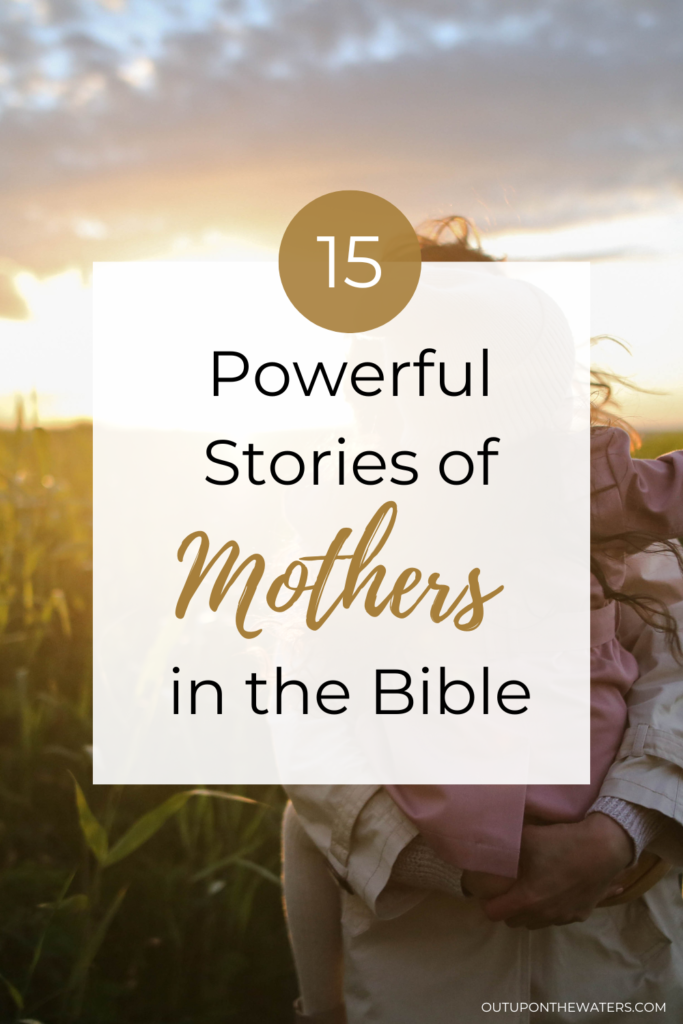
15 Stories of Mothers in the Bible
We can learn so many lessons from mothers in the Bible. They teach us lessons not just about motherhood, but about faithfulness, risk, doubt, and taking our place in God’s story. Here are 15 remarkable stories about mothers in the Bible.
- Eve, mother of all humanity
- Sarah, mother of Isaac
- Hagar, mother of Ishmael
- Rachel and Leah, wives of Jacob
- Rebekah, mother of Jacob and Esau
- The Widow of Zarephath
- Jochebed, mother of Moses
- Hannah, mother of Samuel
- Bathesheba, mother of Solomon
- Rahab, mother of Boaz
- Naomi and Ruth
- Elizabeth, mother of John the Baptist
- Mary, mother of Jesus
- The Widow of Nain
- Lydia, follower of Jesus
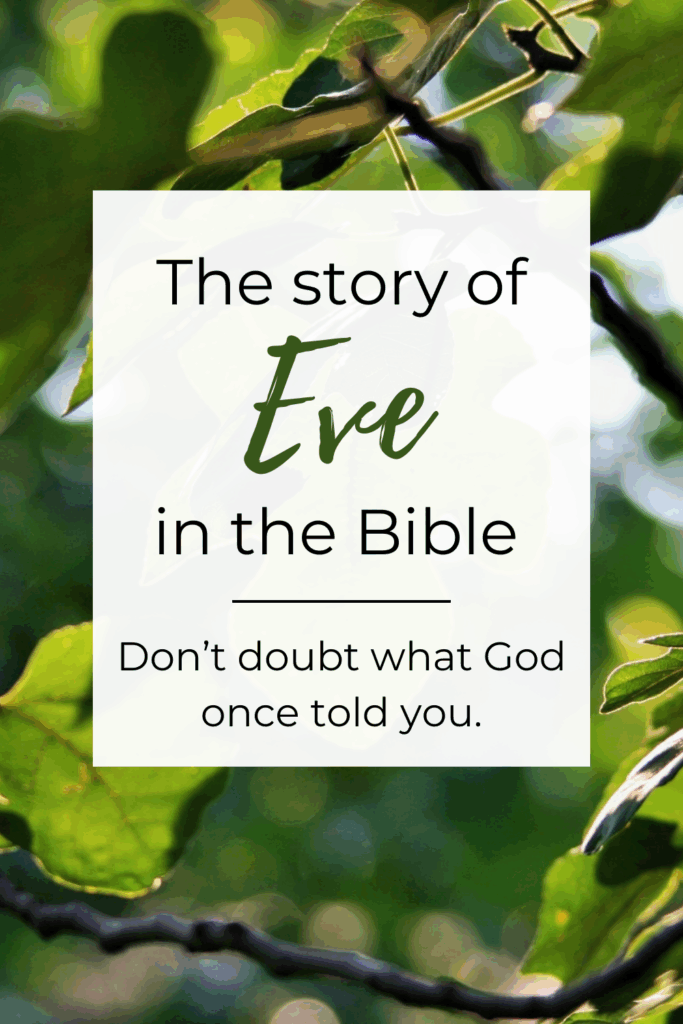
Eve, mother of all humanity
Eve is the first woman, the first wife, and the first mother in the Bible. Eve is the mother of all humanity, and she is a remarkable example of the tension between faith and doubt, and a resilience in the face of obstacles.
Of all the mothers in the Bible, Eve is the first. The name “Eve” in Hebrew, is the word for “life” or “living”. It carries connotations of breath and life. It can also mean “full of life” or “mother of life.”
Eve is created by God to live in perfect harmony with creation and with her partner, Adam (Genesis 2). The trouble comes in Genesis 3, when the serpant tempts Eve to eat the fruit of the forbidden tree of the knowledge of good and evil. What is fascinating about this part of the story is that Eve’s downfall comes when she doubts what she had previously known to be true about God.
Lessons Learned from Eve: Don’t doubt what God once told you & you are a beloved child of God
Eve shows that she knows the rule that God had set, that “You must not eat fruit from the tree that is in the middle of the garden, and you must not touch it, or you will die”. But the serpant introduces doubt into her faith. Eve doubts what she had known to be true, and this leads to her taking the fruit and then trying to pass the blame onto the serpant, when confronted by God.
What we learn in the story of Eve, and in the unfolding of God’s story after her, is that Eve’s identity is not determined by what she has, what she does, or what people say about her. Material success, having things, doing great things, and being significant are not God’s plan for her. They are temptations that she gives into: she is tempted by a material thing that will make her significant and allow her to do great things, i.e. to sit in the judge’s seat and determine right and wrong for herself. Fundamentally, what Eve is is a beloved child of God. She is the mother of all humanity, whom God sent his Son to redeem and to bring back to himself.
Eve also shows us remarkable resilience in the face of obstacles. When cast out of the garden of Eden, Eve and Adam make a life for themselves in a hostile environment, now filled with hardship and conflict. Eve gives birth to Cain and Abel, and then to Seth, taking her place at the beginning of God’s grand story of redemption.

Sarah, mother of Isaac
The story of Sarah in the Bible gives us a wonderful illustration of faith, doubt, and God’s own faithfulness.
In her old age, God promises Sarah a son. Initially, Sarah is, shall we say, incredulous. The story of Sarah laughing in the Bible is a well known story, and Sarah’s laughter is often taken to be laughter of joy. At the beginning of the story, though, Sarah’s laughter is probably that of skepticism and doubt.
When God confronts Sarah about her laughing after he had promised her a son, Sarah denies it. God simply responds, “Yes, you did laugh.” Here, God shows that he is in control. He also shows some patience and compassion. God’s simple reply of “Yes, you did laugh,” reveals Sarah’s heart. God knows what is in Sarah’s heart. He knows her deepest fears and her deepest doubts. He doesn’t condemn her for them. He simply acknowledges their presence, coaxing out of Sarah the feelings, fears, and doubts that are in her heart.
At the end of this story, Sarah gives birth to Isaac, and again she laughs, but this time it is laughter of joy.
Lessons Learned from Sarah: God is faithful, God is in control
Throughout Sarah’s story, we see God’s omnipotence, his power, and his mercy. We see Sarah’s faith and her doubt. And we see God acting like a loving parent, coaxing Sarah’s deepest fears and doubts out of her, and yet loving her despite the doubt. Even when Sarah’s faith fails (as ours inevitably does as well), God shows his faithfulness.

Hagar, mother of Ishmael
In the book of Genesis, we read the story of Hagar and Ishmael. Hagar is Sarah’s slave, and she is used by Sarah and Abraham in a plan that they think will accomplish God’s plans. God had promised Abraham and Sarah a son, and since they were both well into their old age, they thought that they would take things into their own hands and have a son in the way that they saw fit (not the way God saw fit). Abraham had a son by Hagar, and this breeded resentment in Sarah. Hagar is mistreated and eventually runs away into the desert.
When Hagar is in the desert, she encounters God. God asks Hagar: where have you come from and where are you going? In doing this, God gives Hagar a voice, an opportunity to tell her side of the story the way she has experienced it.
When Hagar explains that she had been running away, and tells God of her suffering, he doesn’t immediately fix the problem and take that suffering away. Instead, he tells Hagar to return to Sarah. In this story, though, when we did deeper, we see that God expresses great concern and care for Hagar even in her suffering.
First, God uses Hagar’s name (Sarah and Abraham never do), thus recognizing her value as a person. God asks Hagar to tell her story, in asking her where she has come from and where she is going, he is asking her what happened and what she plans to do about it. He also promises that, although this situation isn’t immediately fixed, there will be blessings on the horizon. God promises Hagar a son, Ishmael, and he shows her that he knows the intimate details of their lives. God knows and cares for them both. God also sees the big picture: in his promise of a son, Hagar will have someone to take care of her in her old age.
God promises Hagar not only a son but also many descendants.
Lessons Learned from Hagar: God will provide & God sees the big picture
This promise draws Hagar’s attention to a picture bigger than her current situation. But the picture is even bigger than Hagar’s old age and her descendants. Hagar’s story is situated in the bigger story, in the biggest story of all, in fact: the story of God’s redemption and reconciliation of humanity to himself. God sees the bigger picture outside of the constraints of time.
In this one mother’s story, we see God’s care for us, we see a promise for future blessings even when the present seems bleak, and we see the ultimate promise of redemption and reconciliation, accomplished far later than Hagar in Jesus Christ.

Jochebed, mother of Moses
Jochebed was the birth mother of Moses. This was during the time of the Israelite’s enslavement in Egypt. Pharoah had given an order to all people in the land that every Hebrew boy who was born must be thrown into the river. Jochebed, a Hebrew woman from the tribe of Levi, became pregnant and gave birth to a son. At the birth of the child, she disobeyed Pharoah’s order and hid her son in her home for three months. When she could hide him no longer, she made a basket of papyrus, coated in pitch so that it was waterproof, placed the baby Moses in the basket and floated him down the river. He was found by Pharoah’s daughter, who cared for him and then adopted him (Exodus 1-2).
Lessons Learned from Jochebed: Put all your trust in God
From Jochebed, we see the profound love of a mother who is willing to take risks to protect her child, and we see a faith that God is in control. Jochebed disobeys Pharoah’s orders in order to protect her son. And when she can no longer keep him safe, she takes a leap of faith and places her trust in God to care for Moses. Jochebed did as much as she could, as much as was in her own power, but then she had to do something risky. She had to release control over her son, and trust that God would go with baby Moses and protect him. During his entire life, Moses walked faithfully with God. In his infancy, his mother had to let go of her own ability to control the outcome, and trust that God would protect her child.
The story of Jochebed represents the story of every mother. We do our best for our children, and we want to love and protect them, but ultimately there comes a time when we must give up control and trust that God will walk faithfully with our children through whatever they will face.
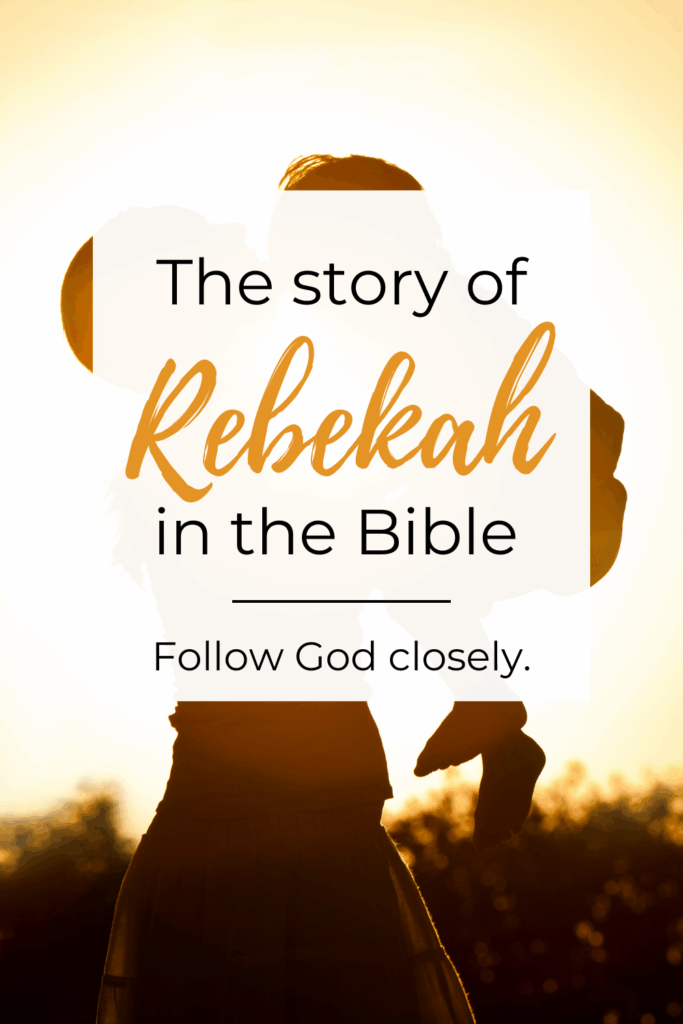
Rebekah, mother of Jacob and Esau
We read the story of Rebekah in Genesis 24. As Abraham was approaching the end of his life, he asked his servant to go to his home country to find a wife for his son Isaac. Abraham’s servant prays to God to reveal the woman whom God himself has already chosen to be Isaac’s wife. Standing beside a natural spring, he prays for a sign, saying “May it be that when I say to a young woman, ‘Please let down your jar that I may have a drink,’ and she says, ‘Drink, and I’ll water your camels too’—let her be the one you have chosen for your servant Isaac” (Genesis 24:14). Just then Rebekah comes out with a jar on her shoulder, and when the servant asks for a drink, she responds by offering water and also to water the servant’s camels. (We can note that this sign that Abraham’s servant asks for demonstrates Rachel’s kindness and generosity.) Rebekah becomes Isaac’s wife and gives birth to twins, Jacob and Esau. When they grow up, Jacob will deceive their father Isaac into giving him the blessing traditionally reserved for the firstborn, Esau.
Lessons learned from Rebekah: Follow God closely
The story of Rebekah gives us an ambiguous picture, showing us a flawed mother in the Bible. In the midst of Jacob and Esau’s jostling for position, Rebekah shows favoritism to Jacob (never a good idea as a parent, and a good example of what not to do). She also helpes Jacob to deceive Isaac into giving him his blessing (another good example of what not to do). And yet, at the beginning of Rebekah’s story, we see her kind and generous nature in her offering water to a stranger, and going above and beyond and watering his camels too. We see a willingness to risk everything, and to leave everything behind for the sake of God’s plan, when we see Rebekah leave behind her family and her homeland in order to marry Isaac. When Rebekah is pregant with the twins and they are jostling with each other even in the womb, Rebekah seeks out God in prayer and asks what is happening to her. In Rebekah, we see a fallen and broken woman trying (and sometimes failing) to follow God.

Rachel and Leah, wives of Jacob
Rachel and Leah were sisters, the wives of Jacob, who was the son of Isaac. Rachel and Leah’s relationship is marked by jealousy and competition. In Genesis 29-30, we learn that Jacob fell in love with Rachel and agreed to work for her father, Laban, for seven years in order to be able to marry her.
When the wedding night arrived, Laban deceitfully gave Leah to Jacob instead of Rachel, since it was customary to give the older daughter (Leah) in marriage before the younger. When Jacob learned of the ruse the next morning, he agreed to work for seven more years in order to be able to marry Rachel. This event marked Leah and Rachel’s relationship with each other for years to come.
Leah was jealous of Rachel because Jacob loved Rachel more. But Leah was the one who became pregant and bore Jacob many children. Rachel remained childless and became jealous of her sister. She becomes so distraught, that one day she says to Jacob, “Give me children, or I’ll die!” Rachel then gives her servant to Jacob in order to conceive a child. This deepens the rivalry between the sisters, as Leah gives her own servant to Jacob to conceive another child. The rivalry and resentment continues and intensifies. (Eventually Rachel did give birth to two sons, and she died while giving birth to her second.)
Lessons Learned from Rachel and Leah: Don’t compare yourself to others & you are valuable and loved just as you are
The lesson that we can learn from Rachel and Leah as mothers in the Bible is that children are precious gifts from God, but wrapping up our entire identity in bearing children can have destructive consequences. Rachel’s initial infertility led her to feel like she was not enough. Infertility and miscarriage in any woman can lead to profound feelings of failure and loss; telling ourselves that this is our sole purpose compounds the suffering. Comparing ourselves to other mothers can also poison our relationships and lead to anxiety and feeling like we are not good enough.
The Widow of Zarephath
The widow of Zarephath is one of the mothers in the Bible who remains nameless. This woman gives us an example of a profound faith displayed through action. She appears in the story of Elijah in the book of 1 Kings. There was a great drought, with no dew nor rain in the land for years. God had sent Elijah out into the wilderness, to be fed by ravens and to drink from a brook. When the brook dried up, God sent Elijah to Zarepath, where he said that he had directed a widow to supply Elijah with food.
When Elijah arrived at the widow’s house, he asked for some bread. The widow replied, “I don’t have any bread—only a handful of flour in a jar and a little olive oil in a jug. I am gathering a few sticks to take home and make a meal for myself and my son, that we may eat it—and die” (1 Kings 17:12).
Elijah said to her, “Don’t be afraid. Go home and do as you have said. But first make a small loaf of bread for me from what you have and bring it to me, and then make something for yourself and your son. For this is what the Lord, the God of Israel, says: ‘The jar of flour will not be used up and the jug of oil will not run dry until the day the Lord sends rain on the land’” (1 Kings 17:13-14).
The widow did as Elijah had instructed her, and her jar of flour and jug of oil never ran dry.
Some time later, the widow’s son became ill and died. She turned to Elijah for help, who stretched himself out on the boy and cried out to God, who returned him to life.
Lessons Learned from the Widow of Zarephath: You can trust God to provide
In both cases, we see the result of faith in this story. The widow of Zarephath displayed great faith when she used the last of her resources to feed Elijah, and her faith was rewarded with provision. We also see the faith of Elijah in calling out to God to restore the woman’s son to life. Again, this faith was rewarded. Further, when we zoom out from this story and consider God’s hand in providing what we need, we also see that God had prepared the way for Elijah. The woman’s faith ultimately came from an inspiration from God. Perhaps, considering this story, when we feel like we do not have enough faith, we can pray to God to inspire that faith that we lack.
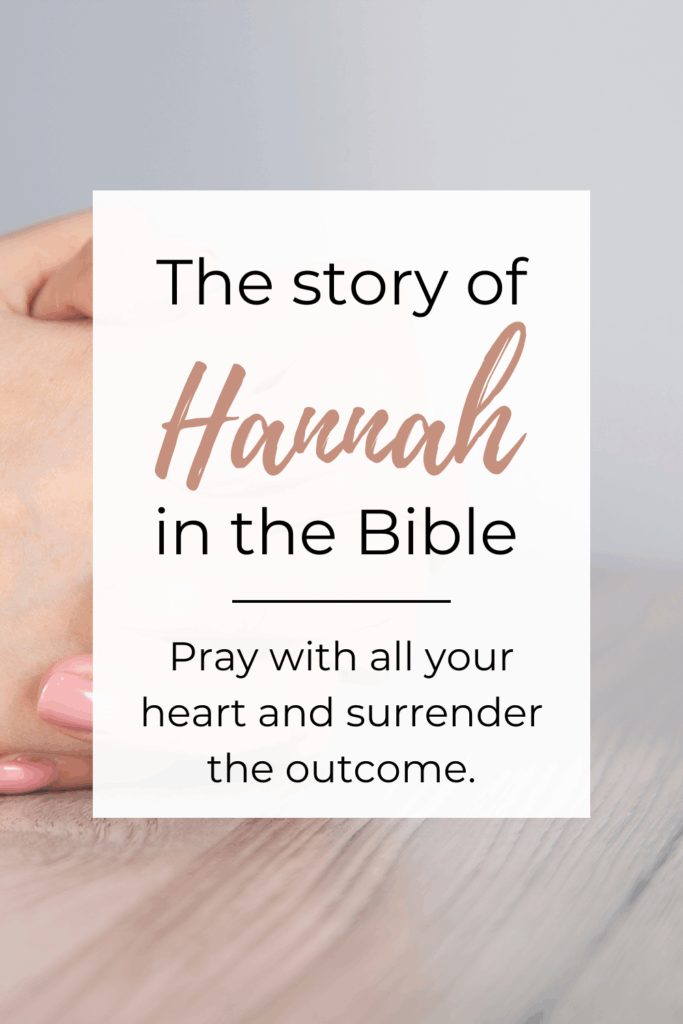
Hannah, mother of Samuel
Hannah is a remarkable example of mothers in the Bible who prayed powerful prayers for their children, and who followed through on those prayers. We read Hannah’s story in 1 Samuel 1. There, we learn that she was one of two wives of a man named Elkanah. Like Rachel, Hannah was unable to have children, and she was distraught. Peninah, Elkanah’s second wife, had children, but Hannah had none. Peninah provoked and irritated Hannah because of this, and caused her much grief.
Hannah’s response to this situation was to go to the temple and pray fervently for a child. Included in her prayer was a promise that if God gave her a son, she would give that son back to him, dedicating him to the Lord and allowing him to be raised in the temple. God remembered Hannah, and she bore a son named Samuel. After he was weaned, Hannah brought him to the temple, where he would be raised by Eli, the priest. Samuel became a great prophet.
Lessons Learned from Hannah: Pray with all your heart and surrender the outcome
In the story of Hannah, we see an example of supplication and surrender. In her distress, Hannah brings her troubles to God and prays for help. In fact, we are told that she “kept on praying” (1 Samuel 1:12). She didn’t just pray once, but continually. Hannah also surrenders the outcome to God. And she recognizes that all things come from God. In giving her son back to God, she is thus only giving to God what is his. God uses Hannah’s surrender to do great things in Samuel’s life. Samuel lives close to God, hears his voice, and becomes a great prophet. In fact, Hannah’s private prayer and concerns expressed to God have a profound public effect on the whole nation. In Hannah and Samuel, we can see how God can work in our surrender when we turn to him and keep seeking him, while also surrendering our plans to his.

Bathesheba, mother of Solomon
Bathesheba is one of the mothers in the Bible who fights for the wellbeing of her child. Bathesheba advocates for her son Solomon
The book of 1 Kings begins with the end of David’s life. Adonijah, one of David’s sons, tries to set himself up as the next king. Bathesheba knew that if Adonijah became king, she and her son Solomon would be out on their own. So Bathesheba went to David, who was near the end of his life, and reminded him of his promise to her that her son Solomon would be king after him. While Bathesheba and David are talking, the prophet Nathan joins them and tells David of Adonijah’s attempt to take the throne. David intervenes and makes Solomon king, thus ensuring Solomon and Bathesheba’s place in the palace and their safety and livelihood after his death.
Lessons Learned from Bathesheba: Interceding for your children is powerful
What we learn from the story of Bathesheba is the importance of her role as intercessor on behalf of her child. In ancient Israel, especially in the time of 1 and 2 Kings, the role of “queen mother” is an important one. In 1 and 2 Kings, the mother of every Judean king is named, except that of Jehoram and Ahaz. In the culture surrounding Israel at that time, there were many letters addressed to the queen mother (preserved from thirteen-century BC Ugarit), requesting her intercession on their behalf to the king for particular concerns. This shows that the queen mother played an important role as advisor to the king and as intercessor.
We see Bathesheba intercede on behalf of her son. There had been a rivalry between Solomon and Adonijah. And Bathesheba’s intercessions helped in establishing what was just (David had promised Solomon the throne) and in protecting her son’s future. Later, Adonijah goes to Bathesheba, asking her to intercede for him once Solomon is king. She does so, in a way that protects her own son and undermines Adonijah’s continued attempt to usurp the throne (1 Kings 2).
As Bathesheba was an intercessor for her son, so too we can intercede for our children, praying to God on their behalf. Our role as intercessor is a powerful one, and it is a way that we can seek guidance, protection, and provision for our own children.
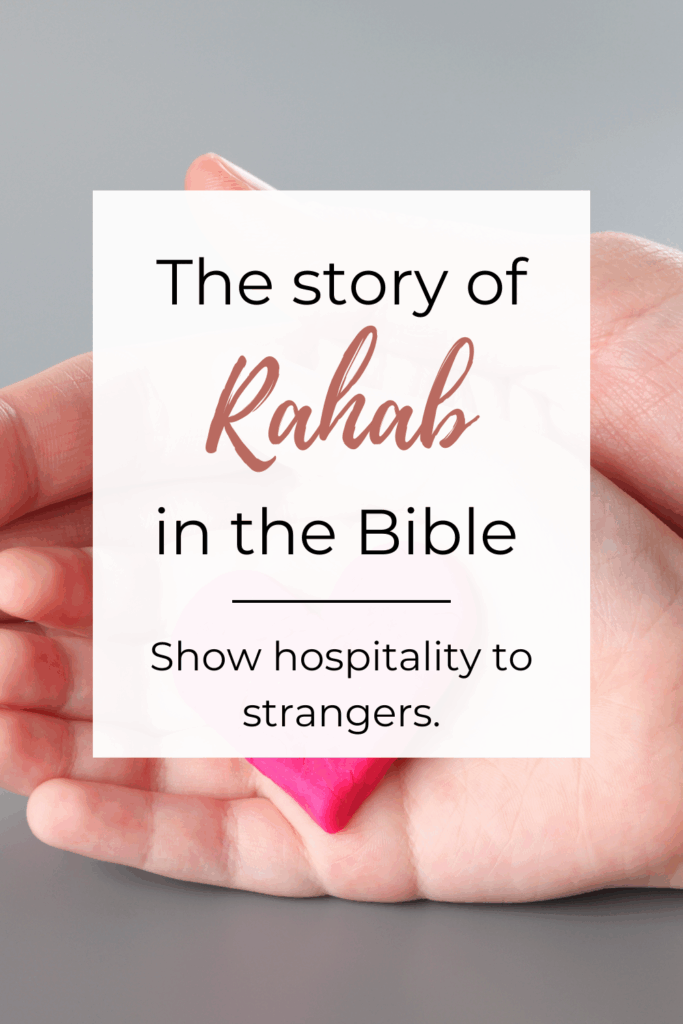
Rahab, mother of Boaz
The story of Rahab is the ultimate story of God bringing the marginalized into his own family, and blessing others through someone considered an outsider. We meet Rahab in the book of Joshua. Rahab is described as a prostitude who helped Joshua’s spies, who were sent ahead of Israel in order to spy out the land of Canaan. This is the “promised land”, which God had promised to Abraham and his descendents.
When Jericho, the city in which Rahab lived, was conquered by the people of Israel, Rahab and her family are spared, because of her loyalty and faithfulness to God and his people. Rahab shows us an example of hospitality that is born out of faithfulness. She has seen God’s work in the past. She tells the spies that, “the Lord your God is God in heaven above and on the earth below.” And she expresses trust in God’s plan. Because of her faith, Rahab opens her home to the spies and gives them shelter. We learn later that she becomes the mother of Boaz and is given a place in Jesus’ family line.
Lessons Learned from Rahab: Show hospitality to strangers
This hospitality shown to strangers is a characteristic of God’s kingdom. We see this kind of hospitality again in the life of Jesus, who welcomes the stranger, the outcast, and the marginalized. And we see this hospitality in the grand story of God and his people, as he welcomes people like Rahab into his family, and then extends those boundaries even further, including all people who wish to turn to God and return to a relationship with him.
Because of Rahab’s faithfulness and her willingness to show hospitality and take a risk on behalf of others (she would have been punished severely had she been caught), Rahab is given a place in Jesus’ family line. God draws her into his plan for salvation. Later, we learn that Rahab marries a man named Salmon (possibly one of the spies) and she becomes the mother of Boaz (Matthew 1:5-6).

Naomi and Ruth
Naomi and Ruth are two mothers in the Bible who show us an example of love and loyalty in a time of selfishness and destruction. The book of Ruth takes place at the same time as the book of Judges. In Judges, we see an increasing spiral of violence and destruction as, without a king to lead them, relativism, selfishness, and greed took over and “everyone did as they saw fit” (Judges 21:25).
In the book of Ruth, we learn that Naomi loses both her husband and her sons, becoming childless and a widow. This would have left Naomi and her daughters-in-law with no one to care for them. Naomi urges her daughters-in-law to return to their families of origin, in order to make a life for themselves. Ruth refuses to leave Naomi, insisting that, “Where you go I will go, and where you stay I will stay. Your people will be my people and your God my God” (Ruth 1:16).
It was a time of drought, and hearing that there was food in Bethlehem, Naomi and Ruth set out to Naomi’s hometown. This is where Ruth met Boaz, who showed her and her mother-in-law kindness and mercy, and who eventually married Ruth. Ruth then becomes the mother of Obed, who became the father of Jesse, the father of King David.
Lessons Learned from Naomi and Ruth: Love fearlessly
In the story of Naomi and Ruth, we see an example of love and loyalty in a time of selfishness and destruction. We also see God draw into the grand story of redemption someone who was outside of the “chosen” people (Ruth was a Moabite, a foreigner). Sometimes love and loyalty come from those outside of the circles that we expect.
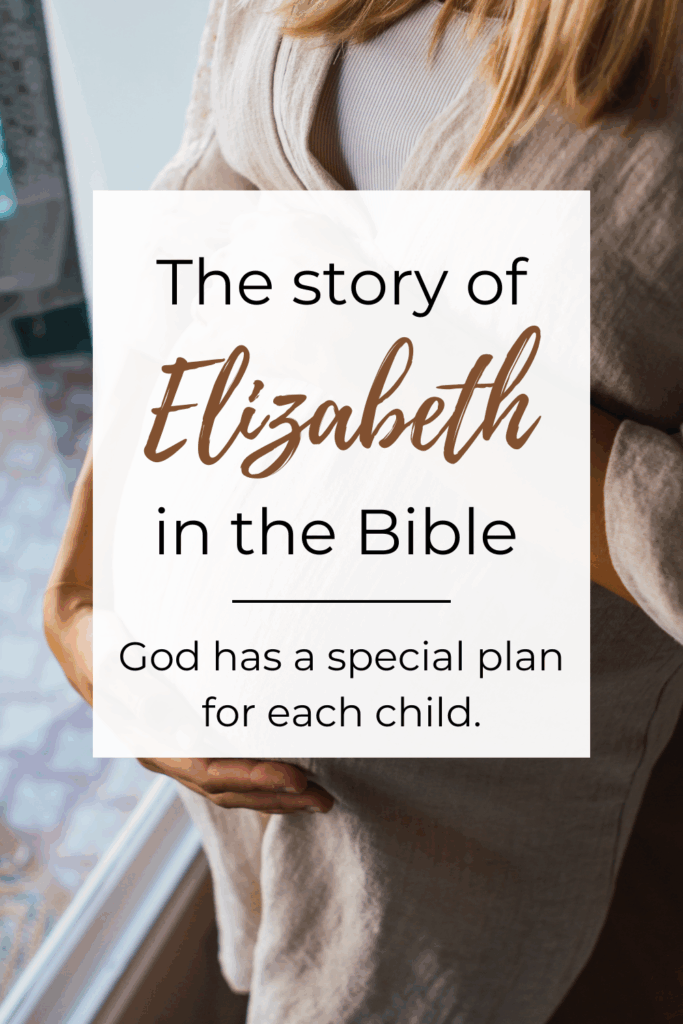
Elizabeth, mother of John the Baptist
Elizabeth is another one of the mothers in the Bible who (like Sarah and Hannah) had been childless, and then miraculously conceived a child. We are told, in Luke 1, that Elizabeth and her husband Zechariah are both very old, and that they were childless because Elizabeth was not able to conceive (Luke 1:7).
One day, when Zechariah was serving as a priest in the temple, an Angel of the Lord came to him and told him that his prayer had been heard, and that he and his wife Elizabeth would conceive a child. This child would be a prophet, he would be filled with the Holy Spirit, and he would “make ready a people prepared for the Lord” (Luke 1:17). Zechariah expresses some disbelief at this at first, and as a result is unable to speak until the child is born.
When Zechariah returns home, after five month serving in the temple, his wife Elizabeth is pregnant and she tells him that “the Lord has done this for me,” (Luke 1:25). Around that same time, Mary, also pregnant, comes to visit her cousin Elizabeth and Elizabeth’s baby jumps for joy in the womb, recognizing Jesus the Messiah. Elizabeth expresses joy over Mary’s child. At the end of Elizabeth’s pregnancy, John the Baptist is born, who will prepare the way for Jesus, the Messiah.
Lessons Learned from Elizabeth: God has a special plan for each child
In the story of Elizabeth and Zechariah, we can see the power and the glory of God. Elizabeth is blessed with a child who will become a great prophet and prepare the people for the coming of Jesus. Elizabeth expresses joy and faith in God during this great adventure. She trusts that God has great plans for the child that she carries. And she recognizes the plans that God has for those around her as well, specifically for Mary when she comes to visit. Though our own stories, in many ways, are different from the story of Elizabeth, there are also profound similarities that we can draw on. Like Elizabeth, we can have faith that God has a special plan for each of our children. We can also bless those around us, and express joy and faith in God’s plan for their own lives.

Mary, mother of Jesus
When we think of mothers in the Bible, Mary might be the first mother who comes to mind. Mary is an inspirational example of a faith that takes risks.
When the angel Gabriel first appears to Mary to tell her that she will give birth to a son, she isn’t immediately filled with joy, but rather frightened and confused. Gabriel greets Mary, saying “Greetings, you who are highly favored! The Lord is with you.” And we are told that Mary was “greatly troubled” by these words (Luke 1). It’s no wonder, since an angel of God appearing in your bedroom is hardly a regular occurance.
The angel reassures Mary, telling her not to be afraid, and that she will give birth to a son who will be called “Son of the Most High”, and who will reign over Jacob’s descendants forever (thus fulfilling the promise that God made to Abraham all those years ago).
Mary asks “how can this be?” for she is a virgin. When the angel explains that the Holy Spirit will enable her to conceive, Mary agrees to the plan, saying I am the Lord’s servant….May your word to me be fulfilled” (Luke 1:38).
Lessons Learned from Mary: Don’t be afraid to follow God into surprising and unexpected places
What is so surprising and remarkable about this story is Mary’s willingness to take risks as an act of faith. She is engaged to Joseph, who we learn later plans to quietly call off the engagement for fear that Mary has been unfaithful. (An angel appears to Joseph and reassures him of Mary’s faithfulness, allowing the engagement to go through.) Mary must have known the risk of being seen as a pregnant, unwed young woman. And yet she trusted enough in God’s plan to put down her concerns for how people will see her, and to give up control over her own future.

The Widow of Nain
The widow of Nain is another of the mothers in the Bible who remain nameless, and yet whose story is lasting and powerful. When Jesus and his companions were travelling in a town called Nain, they approached the town gate and encountered a funeral procession for a young man. Jesus saw his mother, reassured her, saying, “Don’t cry.” Jesus then came up and touched the bier, that was carrying the body, and the bearers stood still. Jesus said, “Young man, I say to you, arise.” The dead man sat up and began to speak, and Jesus gave him to his mother (Luke 7:11-17).
Lessons Learned from The Widow of Nain: We can trust Jesus in our suffering
While this episode is short, and we learn very little about the boy’s mother, we can draw an important lesson from this story: We can trust Jesus with our children. Jesus meets this mother in her grief, and he raises the boy back to life. This story in the Bible gives us a glimpse of the promise of resurrection and the life to come. In this life, we will face loss, disappointment, and deep suffering. We can trust Jesus to meet us in our sufffering. And while he may not raise our children from the dead here and now, as he did with the widow of Nain, still we can look to him for healing, for guidance, for protection, and we can trust in the promise of resurrection and the restoration of all things when this life is done.
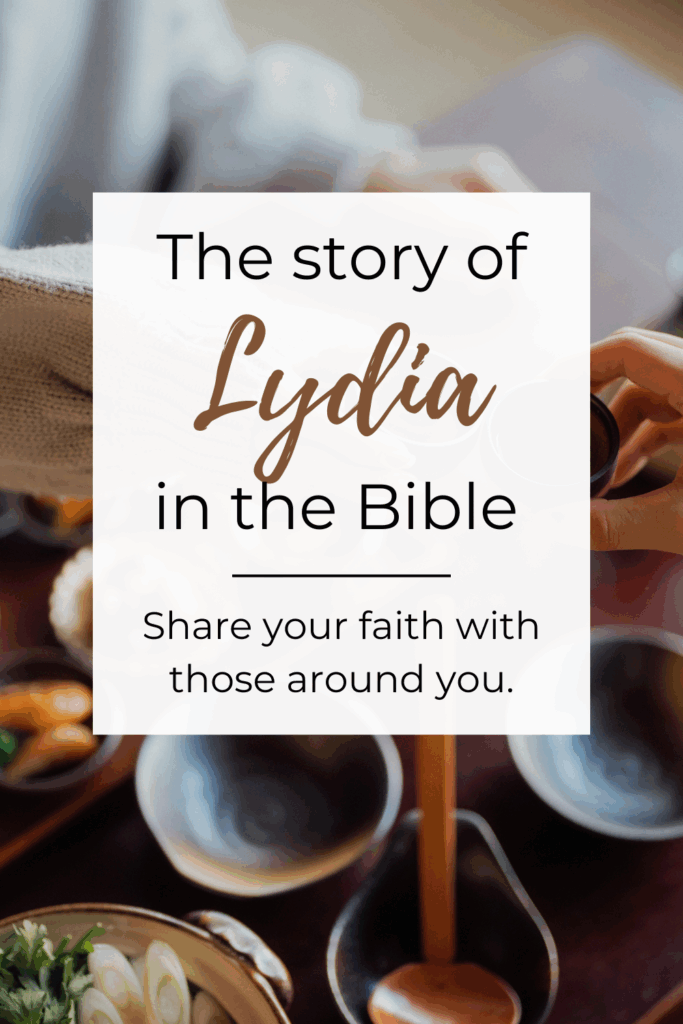
Lydia, follower of Jesus
Lydia is never explicitly named as a mother in the Bible, but since Luke tells us (in Acts 16:15) that Lydia and the members of her household were baptized, we can reasonably assume that she was a mother.
Lydia was also a powerful woman of faith, a businesswoman, and a woman of influence in her household and her community. In Acts 16, we learn that Lydia is a “dealer in purple cloth” and a worshipper of God (16:14). When Paul and his companions were travelling in Philippi, we are told that God opened Lydia’s heart, that she believed and responded to Paul’s message about Jesus, and that she and the members of her household were baptized. Lydia then invited Paul and his companions to stay in her home.
Lessons Learned from Lydia: Share your faith with those around you
In the story of Lydia, we learn the power of a person’s influence on those around them. Lydia was part of a group of women who were listening to Paul’s message about Jesus. Lydia’s heart is opened and she responds to God’s invitation. And then, through her influence, the members of her household are baptized as well, drawing into a relationship with God because of Lydia’s example and influence.
Lydia’s story shows us that when we live out our faith and our love for God, and when we share that faith and love with others, they might be inspired to draw close to God and to follow Jesus as well.
